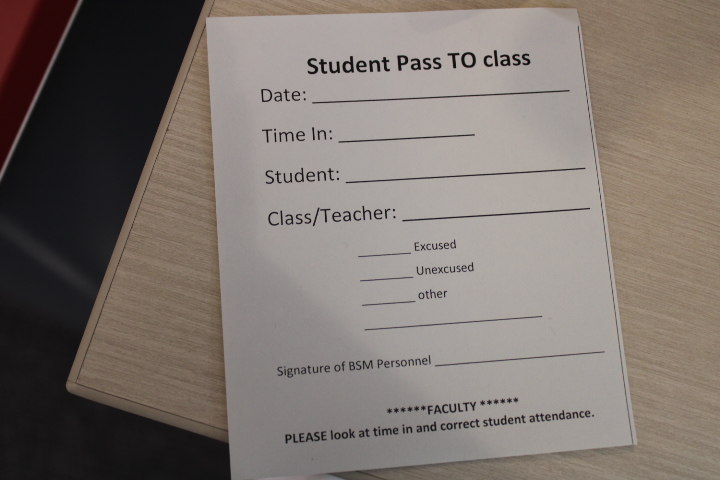Tardies do more harm than good
If a BSM student is late to class, they need a “Student pass TO class” pass.
Tardiness is something all students can relate to, most of the time being late to first period. Being tired, rushed, or behind can lead to poor time management. A major consequence and danger of this is that licensed students will drive faster and be more reckless on the road for the sake of making it on time. Kids will put themselves and others in danger because they fear the punishment that comes with being tardy.
The first class of the day is most frequently associated with tardies. Students will rush into class with their backpacks still on, while the teacher is questioning why they’re late. Even if students make it to class on time, they will still be marked tardy for having to put their backpacks away. Most students enjoyed the no locker rule last year, which made it easier for students to get to class faster.
In most cases, “real jobs” won’t punish their employees for occasionally being a few minutes late. That’s simply not how the real world works. Yes, the idea of tardies helps enforce timeliness on the student’s end, but it can do more harm than good. The whole concept is quite unrealistic. The majority of students are self-sufficient and can take care of themselves; the people who are carelessly late are the issue. If kids are continuously showing up late, they will eventually end up dealing with the consequences of their grades. In the real world, bosses won’t nag their employees to show up on time, it’s the worker’s job to exemplify responsibility and time management. Life outside of school rarely runs on a tight schedule, as everyone is worried about their own issues. Why does school not reflect those values?
Students will skip breakfast, lose sleep, drive recklessly, all because the anxiety and retribution that comes with being late are dangled over their heads. Kids will stay up late doing homework or studying for tests resulting in a lack of sleep. Ideally, students should be getting about eight to ten hours of sleep per night, but homework and studying cuts into sleep schedules. When students are treated like adults in a real-world setting, they are more likely to be compliant and understanding with deadlines. By treating BSM students more like adults, it would result in less tardiness to each class. Knowing that we students would be in control of our schedule, even more, would allow us to be more on time when it comes to school.
Students can relate to timeliness with other activities outside of school such as their sports, jobs, and events.Work creates a sense of accountability, but there isn’t a punishment unless you’re consistently late. Occasionally the student may be late to a practice or shift, but they’re not going to receive punishment such as detention where they aimlessly sit in a room for an hour. The feeling of disappointing a coach or boss is usually enough to motivate them to be on time going forward. Workplaces and activities show that timeliness isn’t as detrimental as the school makes it out to be. There shouldn’t be any harsh punishments unless the student is always late and putting themselves in an unrecoverable position.






































![Teacher Lore: Mr. Hillman [Podcast]](https://bsmknighterrant.org/wp-content/uploads/2025/03/teacherlorelogo-1200x685.png)





hector montemayor • Jan 24, 2025 at 1:04 pm
There is this school project that I have to do and then I have nothing of teachers and then it came to my mind that you guys have a lot of research for someone to rely on.
Aurora • Nov 18, 2024 at 8:20 am
this is exactly what I’m talking about for a school project